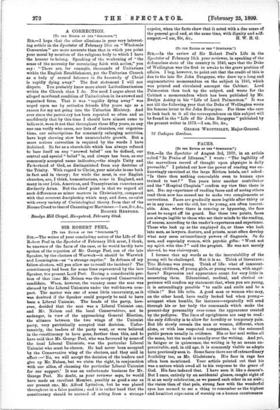SIR ROBERT PEEL
[To THE EDITOR OP THE "SPECTATOR."] SIR,—The writer of your concluding notice of the Life of Sir Robert Peel in the Spectator of February 18th must, I think, be unaware of the facts of the case, or he would hardly have spoken of the rejection of Mr. George Peel, son of the late Speaker, by the electors of Warwick—it should be Warwick and Leamington—as "a strange caprice." In defence of my fellow-electors, will you allow me to recall the incident? The constituency had been for some time represented by the late Speaker, the present Lord Peel. Daring a considerable por- tion of that time Mr. Nelson was the accepted Conservative candidate. When, however, the vacancy came the seat was claimed by the Liberal Unionists under the well-known com- pact. The matter was one of some little uncertainty, as it was doubted if the Speaker could properly be said to have been a Liberal Unionist. The heads of the party, how- ever, decided that the seat was a Liberal Unionist one, and Mr. Nelson and the local Conservatives, not to endanger, in view of the approaching General Election, the alliance between the two wings of the Unionist party, very patriotically accepted that decision. Unfor- tunately, the leaders of the party went, or were believed in the eonstitnency to have gone, farther than this, and to have said that Mr. George Peel, who was favoured by gome of the local Liberal Unionists, was the particular Liberal Unionist who must be chosen. He had never been accepted by the Conservative wing of the electors, and they said in effect :—' No, we will accept the decision of the leaders and give up Mr. Nelson, but we claim the right, in conjunction with our allies, of choosing the particular Liberal Unionist for our support.' It was an unfortunate business for Mr. George Peel. No doubt, as your reviewer says, he would have made an excellent Member, possibly as good a one as our present one, Mr. Alfred Lyttelton, but he was placed throughout in a false position; and it is rather hard that the constituency should be accused of acting from a strange
caprice, when the facts show that it acted with a due sense of the general good and, at the same time, with dignity and self-






































 Previous page
Previous page